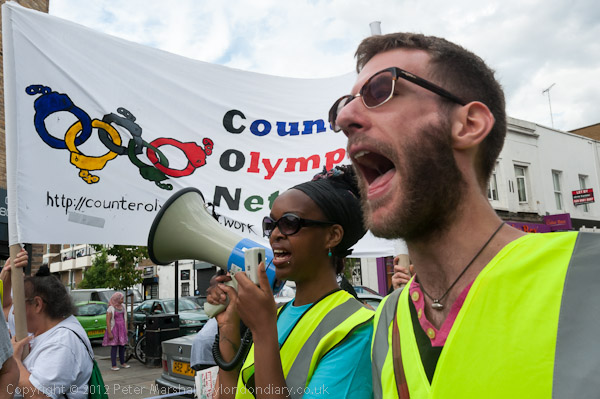
Ten years ago on July 27th 2012, as the London 2012 Olympics were getting underway in Stratford, people, mainly from the local area, marched to call for an end to the corporate takeover of the Olympics and the draconian policing and military presence largely aimed at the protection of brands and for the games to meet its legacy promises.
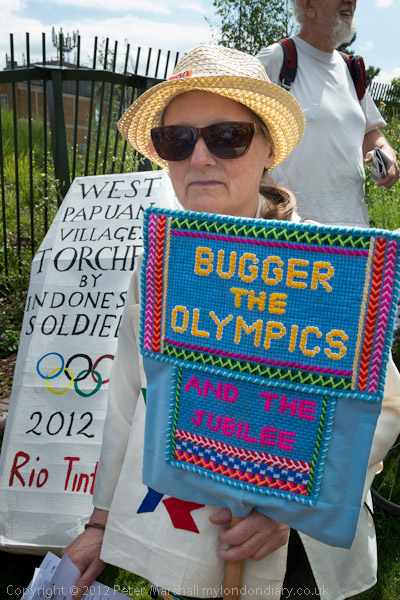
The authorities had done their damnedest to stop the protest taking place – first they had tried to ban it altogether, then Transport for London had refused permission for them to march along any roads which were emergency backup Games routes. But protesters agreed with police that they would leave the road if there was any emergency. Tower Hamlets council tried to ban any speeches or other events on Wennington Green where the march ended, and protesters were threatened they would be arrested if they carried banners, placards or t-shirts with political messages – though it was hard to see any legal basis for doing so.
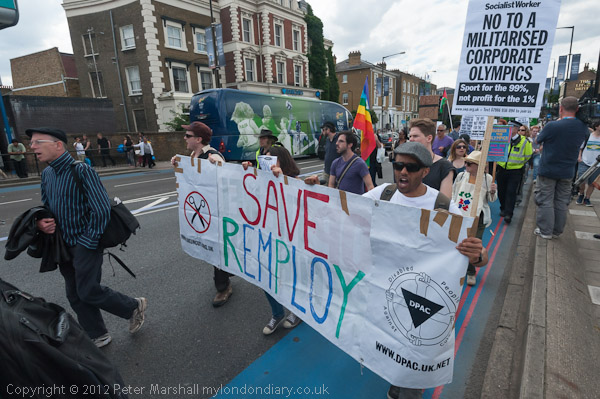
The ‘Whose Games? Whose City?’ protest went ahead despite the threats, with only one small incident when police seized and searched a man who had cut a piece of police tape. A crowd of marchers supported them and shouted for his release and after a few minutes he was set free without charge and the march continued.
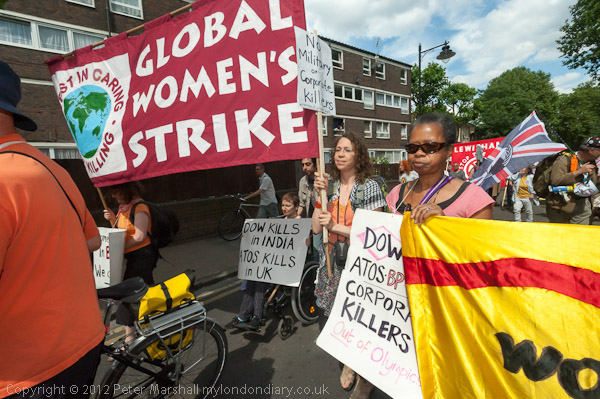
The threats and public controversy had doubtless persuaded many not to come to the event, where around 500 marchers mingled with press and TV from around the world at the starting point in Mile End Park at midday. The organisers, the Counter Olympics Network (CON) had made clear that they were not against the Olympics as a sporting event but against the way it had been taken over by corporate interests. In my long account of the event on My London Diary I quoted from several of their statements, including:
"the close ties between the Olympic brand and its corporate sponsors who, despite IOC claims of vetting on ethical grounds, include serial polluters, companies which seriously damage the environment and which wreck or take lives, Coca Cola, Rio Tinto, BP, Dow Chemical. G4S, Cisco, and Atos deny people their human rights in a variety of situations while Macdonalds helps to fuel the obesity epidemic. London2012 provides benefits at taxpayers’ expense while receiving little in return."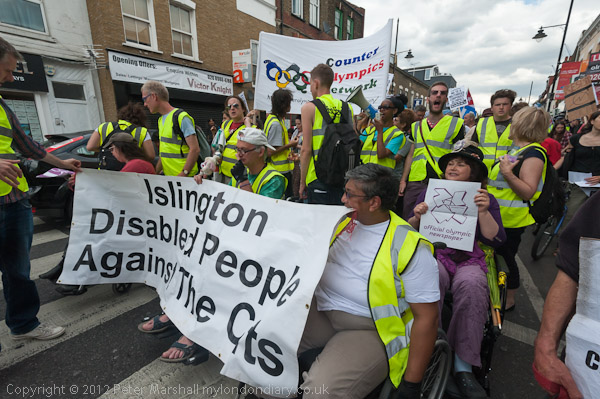
CON also pointed out the many broken promises made about the games and the very doubtful legacy the games will leave, particularly in East London.
"the lack of benefits for local people and businesses, the fantastic expansion of security into our daily lives, the deployment of missiles and large numbers of troops, the unwarranted seizure of public land at Wanstead Flats, Leyton Marsh and Greenwich Park."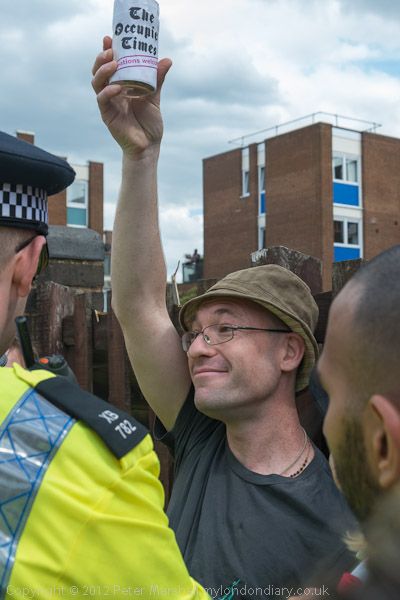
Later in his speech on Wennington Green, Chris Nineham of the Stop The Olympic Missiles Campaign declared that the London Olympics had already set a number of records, including the largest ever number of arrests on the first day, the highest ticket prices, the most intensive application of branding rules and the highest level of militarisation of any Olympic games, with far more being spent on security that even in China. There were now more troops in London than at any time since World War 2, and more than at any time in Afghanistan, where our military activities were now making us a terrorist target in London. Among the other speakers was Melanie Strickland, one of the 182 ‘Critical Mass’ cyclists arrested the previous night for riding near the Olympic stadium.
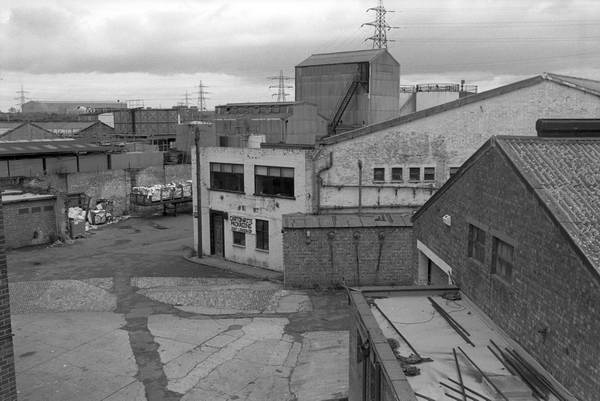
I had known and photographed the Olympic area since the early 1980s until the public were all excluded from the vast site in 2007 and after when we were only able to peer over the blue fence. In 2010 I brought out a book ‘Before The Olympics’ which included many pictures of the area in the thirty years or so before they took place, as well as looking more widely along the length of the River Lea and the Navigation. Most people miss that parts of the area were formerly thriving industrial and commercial sites, others a verdant wilderness – and of course some thriving allotments. Of course there have been some benefits following 2012 – more housing is something London desperately needs, but much was already being planned before the bid succeeded. But the park remains to me deeply disappointing.
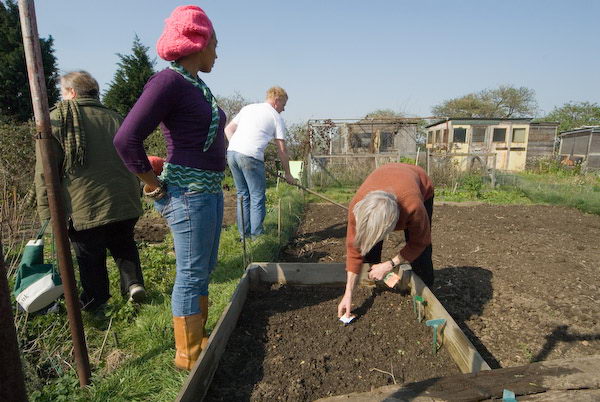
The book is still available and you should be able to view a preview at ‘Before the Olympics‘ though Blurb appears to be having some problems at the moment; it is a ridiculously highly priced softback, but there is a more reasonable PDF version. The book includes many of my pictures of the area which are also on my The Lea Valley web site including mainly black and white images from the 1980s and 90s and colour from the 2000s. Later images from before and after 2012 are on various pages of My London Diary. There is a large collection of the black and white images in my Flickr album River Lea – Lea Navigation 1981-1992 including many from what became the Olympic site.